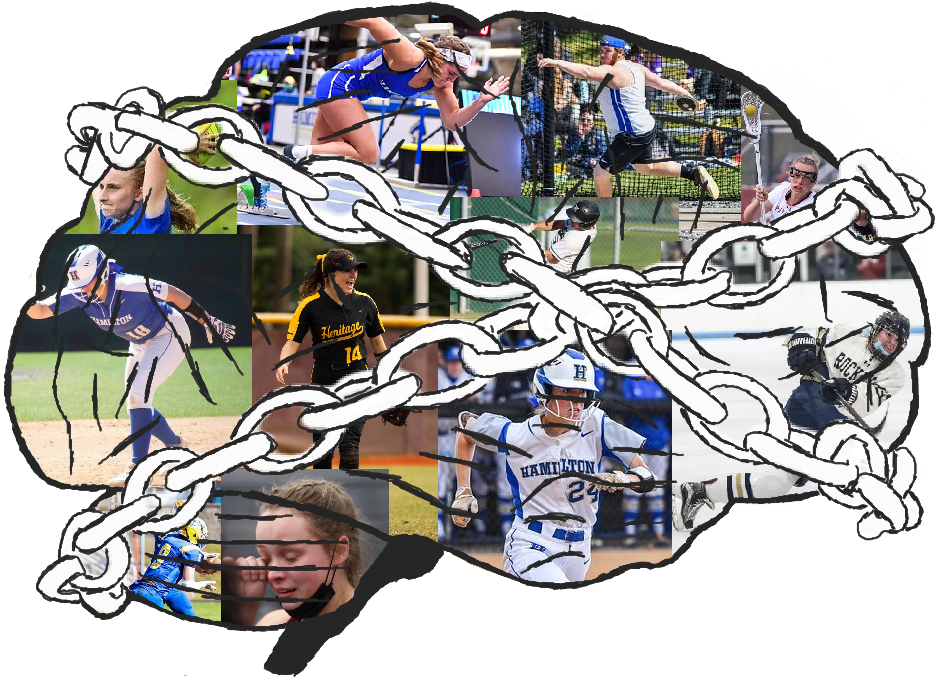
It didn’t matter to me that I won a Class A Section III title in my first year of track. It didn’t matter that I had broken two school records. It didn’t matter that I would be going on to compete at the college level. February 16, 2022 was the NYSPHSAA1 Section III Indoor Track and Field State Qualifier Meet. One bad meet cost me a trip to the State Championship, even though it was well within my reach. In that moment I felt one thing: failure. And this feeling wasn’t something new.
Student-athletes have become increasingly devoted to their sports; they spend more time doing them, and miss important events for them. This can be highly problematic for student-athletes’ well-being when their sport is not going well (Brewer and Petitpas, 2017). While there are numerous benefits to playing sports, including physical fitness, access to social and cultural support, and psychosocial growth (Esopenko, et. al., 2020), student-athletes often exhaust their physical, mental, and emotional capacities seeking validation in them.
“I’m an athlete”
Athletic identity is a component of the self that obtains validation and meaning from participation in sports (Secrest, 2010). Student-athletes colloquially call this seeking “athletic validation.” With athletic identity becoming more salient than other aspects of student-athletes’ lives, student-athletes are becoming increasingly dependent on athletic validation.
Student-athletes are often forced to make decisions between athletic events and other important events including those with friends and family, such as weddings or major holidays, or academic commitments, like missing a class. This greater dedication toward sport can lead to developmental and career disadvantages, including delaying other career opportunities until all athletic opportunities have been exhausted (Huml and Nite, 2019). While athletic validation can have positive implications, athletes don’t always succeed. When athletes don’t succeed, they don’t get athletic validation.
“The absence of athletic validation can lead athletes to have feelings of inadequacy, worthlessness, and a general inability to gain fulfillment from life.”
Secrest, 2010
Student-athletes’ need for athletic validation makes it increasingly difficult for them to forego their sports commitments, as athletes frequently feel guilt or remorse for having missed athletic events, even if it incites a major disruption in their personal lives. Paradoxically, this can lead to remorse as student-athletes transition away from sport and athletic identity has receded (Huml and Nite, 2019).
Who Am I Without My Sport?
Athletes tend to decrease their identification with the athlete role after experiencing events that threaten or diminish their ability to perform as athletes, such as a poor competitive season, deselection, and severe injury (Brewer and Petitpas, 2017). When this happens, a substantial part of their self identity may be threatened, as a result, the remaining part may not be able to obtain sufficient validation and meaning from other aspects of life (Secrest, 2010).
Injuries are one of the most prominent disruptors of athletic validation because unlike temporary setbacks such as losses or a poor performance, the socioemotional effects of injuries are lasting. Similarly, student-athletes who are suddenly forced into involuntary retirement encompass a loss of personal and public identity because of the sudden change in athletic identity; this is linked to a greater likelihood of reporting symptoms of distress, depression, sleep disturbances, adverse nutritional behavior, and lower life satisfaction (Esopenko et. al., 2020).
Preserving Athlete Status
Student-athletes experience particular stressors related to their athletic status, such as extensive time demands, loss of ‘star status,’ the possibility of being benched, conflicts with coaches and more that non-athletes do not (Wilson and Pritchard, 2005). The largest problem with student-athletes in this regard is that athletics may become a priority over academics due to the pressures placed on student-athletes to succeed in sports.
Student-athletes are a unique population that face unique problems. Athletics are a very short, temporary part of their lives, yet are often prioritized over other commitments. By acknowledging this growing imbalance in student-athletes’ lives, we can start to destigmatize student-athletes getting access to the resources they need to succeed academically, athletically, and socially as well as prioritizing what’s best for them rather than just prioritizing sports. It is through this process that student-athletes will be able to flourish best in all areas of their lives.
_____
1New York State Public High School Athletic Association
References
Brewer, Britton W., and Albert J. Petitpas. “Athletic Identity Foreclosure.” Current Opinion in Psychology, vol. 16, pp. 118-122.
Esopenko, Carrie, et al. “The Psychological Burden of Retirement from Sport.” Current Sports Medicine Reports, vol. 19, no. 10, pp. 430-437.
Huml, M. R., & Nite, C. (2019). Are athletes addicted to their identity? The development and validation of the Athletic Identity Addiction (AIA) scale. Journal of Athlete Development and Experience, 1(3), 98-112.
Secrest, M. L. (2010). Narratives of Collegiate Female Athletes Who Sustained Multiple Injuries [Master’s thesis, Bowling Green State University]. OhioLINK Electronic Theses and Dissertations Center.
Wilson, Gregory, and Mary Pritchard. “Comparing Sources of Stress in College Student Athletes and Non-Athletes.” Athletic Insight: The Online Journal of Sport Psychology, vol. 7, no. 1, 2005, pp. 1-8.